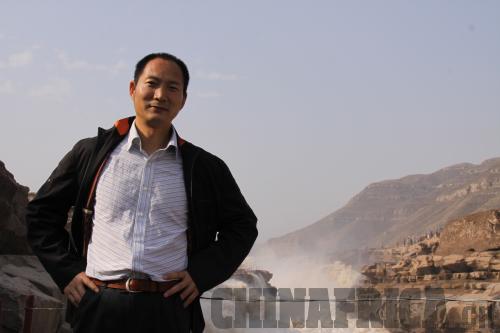|
 |
|
COURTESY PHOTO |
Li Xinfeng, a research fellow at the Chinese Academy of Social Sciences, served as the chief correspondent with the People's Daily in South Africa from 1998 to 2005. Li was in charge of the news coverage in the southern, eastern and central African regions and traveled across the continent, visiting over 20 African countries. His book A Reporter's Exploration: Following Zheng He's Footsteps in Africa, marks China's first book on Zheng He's voyage to Africa, which filled the gap in the research on the history of Sino-African relations. Back in the 15th century, Zheng He, a famous Chinese admiral, sailed with his fleet as far as East Africa. Recently, Li spoke to ChinAfrica about his experiences in Africa as a journalist.
Why did you choose to explore Zheng's voyage to Africa?
In 1999, when I read a news report that some descendants of the sailors of Zheng's fleet still live in the Pate Island in Kenya, I was excited about it. To fully cover this story, I visited there four times. And I observed that even after over 600 years – almost 20 generations - the legacy of Chinese traditional culture is still there. The intangible force of culture, so subtle yet strong, has influenced people and society imperceptibly.
My reports also prove that Sino-African exchanges happened earlier than contact between African and European countries. China is different from the West because its earlier arrival in Africa was not for occupation or colonization, but for peaceful trade and cultural exchange.
How do you look at Africa?
Although Sino-African exchanges happened much earlier than Euro-African contact, we didn't have much direct communication during a period of 500 years. We got to know each other mainly through the West. As the third party, the message the West sent sometimes inevitably involved its own viewpoints. Our understanding about Africa is still not complete and comprehensive. I think the best way to understand Africa is to go there and talk with the local people. My eight years there have changed my previous imagination of Africa and my views on some issues.
As a senior media person, how do you think we should report on Africa? What stories in China shall we tell African people?
To give Chinese readers a real and full picture of Africa, our correspondents should observe Africa through their own eyes, speak to local Africans and experience the African lifestyle. They should not just stay at home, translate or compile news reports from the Western media.
During the eight years, I traveled across the continent and visited over 20 African countries. To gain a more accurate understanding of Africa, I traveled to other places within each country outside its capital city. Normally, the capital city is relatively developed, and only visiting the capital makes your understanding of a country one-sided. To better understand a country, one not only needs to visit its cities, but also its rural areas; one needs to pay attention to the daily life of ordinary people.
Similarly, when we tell African readers stories from China, we should give them a full picture of the country. We not only report on big cities, but also the rural areas. We not only write stories about our economic development, but also the stories in poor regions where people don't have adequate food and clothing, and children cannot afford to go to school. This way, African people can get to know the real China.
Among all the people you interviewed in Africa, who impressed you most?
I interviewed Nelson Mandela many times. He is a person I admire and I feeI I learned a lot from him, such as generosity, perseverance and treating others as equals. Currently, I am writing a book about him, and the main focus is on how he treats people around him. The book is based on the interviews and first-hand materials I collected in Africa. Now half is done, and I hope to complete it next year.
Many people commented that you're a scholar-journalist after reading your book. Do you accept this title?
This may have something to do with my character. Whenever I do something, I will do my best to do it well. When covering each story, I always make sure I understand the issue first. It's more time and energy-consuming to be a scholar-journalist, but the experience is more fruitful. For instance, before my interview with Nadine Gordimer, the famous South African writer and the 1991 Nobel Prize Winner for Literature, I did my homework and read some of her works, so I asked in-depth questions during the interview. The interview turned out to be a success, and the report was recognized by the Chinese literary circles. |